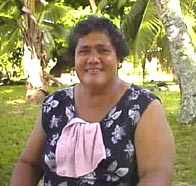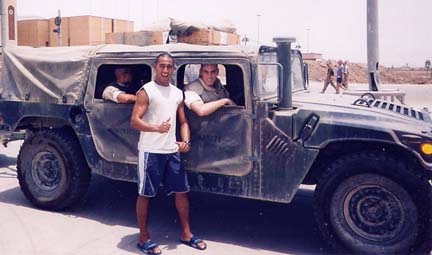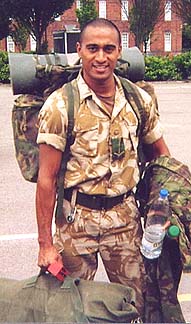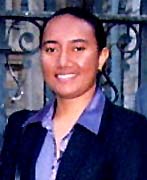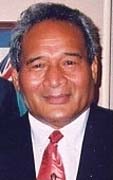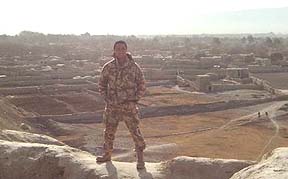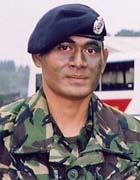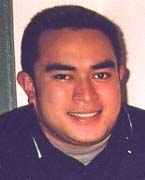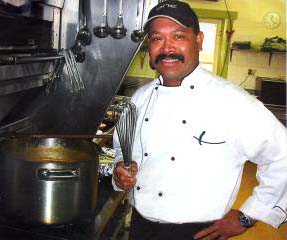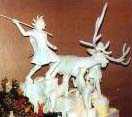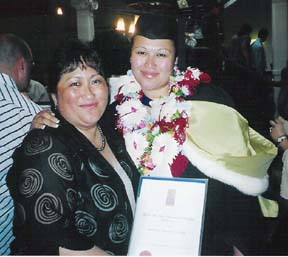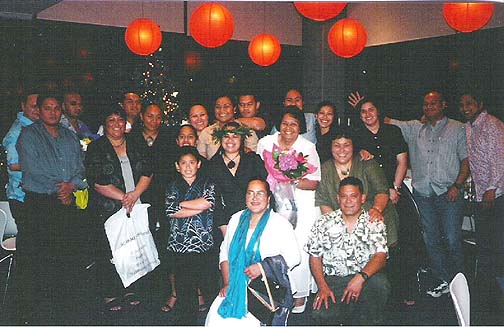|
| From Sanimeli Maraf in Rotuma (12 January 2004, posted 29 January) Today the Council met to celebrate the mamiag ne bus fo'ou heta. I just saw the bus drop off Maraf after their celebration and it does look great. So we now have two small (mini) buses besides the four big ones. The holiday season (av mane'a) will be closed on the 17th of this month. We have had a lot of overnight picnics on Afgaha this year. They come from Malhaha along with relatives from the different districts, but of course they have to get permission from the Afgaha land owners. The Oinafa district chief stopped the picnic litterers because of the beautiful beach being spoiled with rubbish, which is fair enough, so the kakau turn to Fuli'u and Joro in Kalvaka. Most of our local youths and children are visiting families from overseas, including Dianne Stevens from Melbourne. Dianne is a friend of Rev. Viliame Fatiaki & his wife, Rosarina. She was here in 1993, so she's no stranger to the Noa'tau children. The other Sunday, Dianne told the children's story at Saione Church, while Maraf conducted the service. Everyone enjoyed seeing a different person and hearing a story that was nicely put together. Rev. Viliame Fatiaki is transferring to Vunda where he will be at the John Wesley College. He is the youngest son of Rev. Iveni Fatiaki and his wife, Jioje. Viliame and Rosarina have a son, Ieli. May God bless them; they are so young and they've got a long way in life to serve the ministry. Rosarina is a school teacher. On New Year's day at 10 p.m. God called the life of Mr Robert Coy, husband of Lavenia, at Noa'tau. It was sad, and a big surprise to all of us. May his soul rest in peace in Oa' cemetery. Well, after the holiday season we all wait for news of who has gotten together with who, and the weddings in the air. The flights are still fully booked, as is the Cagi mai Ba. The government boat is arriving this week to clear off the rest of the holiday makers. News from Elisapeti Inia in Rotuma (4 January 2004, posted 29 January) The Savlei fara group went round Rotuma one Saturday from 5 p.m. to 10:30 p.m., which was not very late. This trip was on the bus and was paid for by Kona'u and Marieta, who are on holiday with their daughters a Savlei. The Savlei kids really enjoyed that night. We only went fara to our district chief, Dr John Fatiaki, Tim & Christine of Haga, Marieta & Joe of Lopta, and came back with $200 and a lot of big watermelons. The Cagi ma Ba will be the first boat to come and will take the Nadi group back to Lautoka. It will be followed by the government boat on 13 January, but the Cagi ma Ba will have to come again for the rest of the visitors. All flights to Suva were full. The weather has been very kind to the young people who throng the roads going fara. Not a night has been marred by rain. Mangoes, pineapples, watermelons were plentiful and people enjoyed them to the full. Itu'ti'u's two bands--the Losa Band and the Motusa Bay Boy's Band--played at the young people's dances at Motusa Hall and Noa'tau Hall. The boats not only brought a lot of visitors and food, but cargoes of cement, building materials, and lumber for building houses, including a teacher's quarters for Motusa School. Our bush roads at Savlei will be repaired soon after av mane'a, with seven tons of cement from the government. The boats also brought more vehicles, including two brought by their owners to be used until they go back to Fiji with them. One is owned by Peter Faga Mario, the manager of Unit Trust of Fiji. A kato'aga was held at Haga, Juju, to show him how glad the people of Juju and Pepjei are and how thankful that he has achieved the highest professional business degree [Dr. Mario was awarded the degree of Doctor of Business Administration at the Southern Cross University, Lismore Campus, NSW, Australia in September 2003]. He completed his thesis, which normally takes seven years, in three years. Dr Mario is married to Sauhani of Islepi, Juju. The entertainment at the kato'aga was a big hafa composed of youths from Pepjei and Juju plus various Polynesian dances by Dr Mario's daughter and some Pepjei girls. The Nadi group, who were the last to come before Christmas day, will be the first to return home. They stayed in their own families' homes instead of in one place like those who came in groups in the past. From Hiagi Wesley in Orem, Utah (23 January 2004) After seeing a screening of The Land Has Eyes at the Sundance Film Festival on 20 January, Hiagi provided the following review:
From Alan Howard in Honolulu (22 January 2004) I have just returned from the Utah where I attended two screenings of Vilsoni Hereniko's film, The Land Has Eyes. Seeing it on a big screen in a theater filled to capacity was a very moving experience. The movie is just plain wonderful, and Rotumans everywhere should be grateful to Hereniko for presenting their island and culture to the world in such a beautiful way. It was filmed entirely on Rotuma and is in the Rotuman language with English subtitles. All of the cast, except two, are Rotumans who had never acted before, but they gave compelling performances that moved the audience to tears. I am happy to report that the audience at both screenings, most of whom were not Pacific Islanders, gave it rave reviews. If you have any Rotuman blood in your veins, or have ever been to Rotuma, you must see this film when you have an opportunity. For those of you who live in Europe, the film will have three screening at the very prestigious Rotterdam Film Festival: Wednesday, January 28 10:45 PM, Thursday, January 29 1:00 PM, and Saturday, January 31 3:44 PM. I would recommend that you get tickets as soon as possible. The theaters at the Sundance Festival were sold out early and tickets were hard to come by. Tickets for the Rotterdam Festival can be purchased online at the festival's website. Vili will be there and would love to have a Rotuman presence supporting the film. The Utah Rotuman community put on quite a show at the party following the premiere screening of the film on Friday, 16 January. They danced a tiap hi, followed by fara style dancing that engaged the audience. A Fijian trio, flown in from New York by the Fiji Visitor's Bureau, also performed. The FVB also sent Sapeta Taito, who plays the lead role in the movie, from Suva to Utah where she charmed everyone. Between screenings I was privileged to stay with Hiagi Wesley and his family in Orem, Utah. On Monday, 19 January, Hiagi invited the Utah Rotumans over for a party, which was lots of fun. Among those present were Victor Narsimalu and his Tongan wife Mere; Victor's mother, Valesi, who is visiting from Suva; Gaylene Hutch and her Tongan husband who is attending law school; Lillian and Terry Ralphs (Lillian is from Tuakai) and their infant daughter Charity. Also present were Elders Ben Wanamaker and Adam Chase, both of whom served as Latter Day Saints missionaries on Rotuma recently. Other Utah Rotumans who were unable to attend are Sam and Krista Rigamoto, Mari Sievinen, and Eric & Lindsey Sievinen. Inspired by the film, the Utah group is planning to get together on a regular basis for taumakas. The Land Has Eyes is getting a good deal of media attention, and because of it thousands of people are learning about Rotuma for the first time. For information about The Land Has Eyes go to the film's website at www.thelandhaseyes.com. For recent media attention to the film check out an article in the Honolulu Advertiser. From the family of Katarina Aitu (14 January 2004, posted 22 January) Katarina Ieli Aitu passed away quietly on 13 January at Elsio, Malhaha, Rotuma. Her last few breaths were at Mafana, Elsio. She was buried the night of the 13th due to health regulations & unavailable facilities on Rotuma. Katarina is buried in the same grave site with her mother Akata and grandmother Hiagi 'e tamure te Elsio, Malhaha. She is survived by her husband Aisea Aitu and his two sons, Elder Aitu (Walter serving an LDS mission in Fiji) ma Pierre Aitu in Rotuma and one daughter, Yvonne Sunia Mafileo in California; a brother Alfereti Ieli and Tivakno Sievinen in Florida.
Katarine ta on ne le ole Samuela Ieli ma Akata Irkonusi. Akata ta han ne Mafana ma Solsesei, Elsio. Teran liam on Katarina la 'e Aiat te 'e ran samahif ta 'e Mafana, hanua on Sakio ma Akata. Au he teis amis ahae la uaua'ak 'ati pau se kainag atakoa on Katarine ma Aisea 'e Rotuma ma 'e ut tutu ne ran te, who are arranging services and such as we write this email, se Aunty Sauroa ma o'o tutu ne fai'ak e mata' ne o'hon ta Katarine 'e fau 4 ne ia tak se takag ne afafa. Uaua'ak ti pau se Dr Ane Atalifo ma Dr Taukave ma Dr atakoa ne garue vah 'e Ahau ne io io se Katarina 'e au het ne ia tak afafa 'e. Noa'ia se Fekau ne re'ia rotu 'e pogit ne ia famu 'e. Uaua'ak se hanis uan maf on kainaga e Malhahat te Rotuma ma tape' ma se kainag ne hanua tu ne a'hae'ak Katarina 'e au het ne ia mauri e ma hele' se on teran al ta. Noa'ia ma uauak ti pau se ir ne kau garuag ta ne os vahia ri hapa, ma osia koua ma a'potsosun vah tamura ma tes hoi'ak. Noa'ia 'e hanis uan mafut se Katarina. Teis uaua'ak meameat ne amis po la faiof se aua 'e ta'a. Hanis ma rot'ak nono ka puk te kat fakag ra, ne kat tau la ma se au ne fai'ak 'e Katarina, hanis ma rot'ak. Hanis ti pauf tape' ma se Aisea ma Pierri ma Sauroa ma kainag tutu atakoa. Hoi'ak noa'ia 'e hanisi! Tivakno, Alfereti, Yvonne ma Elder Aitu From Pam Nataniela Tanu in Suva (19 January 2004, posted 22 January) Tiu Kafoa, who has lived with his American wife, Bonnie, in Washington, died in Suva early in December. Tiu had been away from Rotuma for 28 years before returning for a visit. Apparently, on one trip to the bush, he got a scratch or a mosquito bite and it got infected. Instead of going to the hospital he went for massage instead and ended up with sepsis. After having been flown to Suva, he developed a deep-vein thrombosis, and a pulmonary embolism, which broke loose and killed him. Dr. Ane, who has helped Rotuma dramatically, has been transferred, and will be leaving Rotuma as soon as her replacement arrives. News from Bruce Tizard-Varcoe in England (12 January 2004) From Iraq to Afghanistan: A Rotuman soldier's experiences Sixty years or so after his grandfather
Josefa set sail for Bougainville in the Solomon Islands
during WWII, grandson Lance Corporal Stephen (Sitiveni)
Rigamoto (son of Victor and Kafoa) followed in similar
footsteps with the British army, this time by air,
to Kuwait and on to Iraq. Below are some excerpts
of conversations and photos of his experiences during
his Call to duty: I had only joined my regiment after training, in December 2002, and was then notified a few weeks later that I would be deployed to Iraq, but with no confirmation dates. Preparation: We had briefings on diseases, hostile weapons and were immunised (including anthrax immunisation). I didn't think that I would be going as I didn't have any operational experience and was only informed a few hours before the departure...ahead of the "advance deployment!" On our way: We flew out from England to Kuwait on a Russian military transporter plane at the end of January 2003. Temperature change: The temperature in York, England, when we left was minus 4 degrees celcius and there was snow on the ground, which contrasted with 20 degrees plus upon our arrival in Kuwait. Towards the end of April (at Basra International Airport), the temperature rose to between 34 to 40 degrees. When we left in July, the temperature was between 52 and 58 degrees in the day and 32 to 36 degrees at night.
Set up camp: We set up camp with the Americans, 60 men per tent. As you can imagine, it was crowded with all our equipment. Ventilation was also a problem because of the sand storms. Food: In the first few weeks before the war started, the food wasn't too bad and was actually prepared by Kuwaiti locals. Once the war started though, supply lines were sometimes cut, so we had to ration our food. Sometimes we ate the same kind of food for days. Water was only available for drinking, so no bathing. Work: Being in the Royal Signals, I worked on satellite equipment. I only had a limited working experience though and just a little training on the equipment. Frightening really. The working conditions were cramped and hot. It was hard to maintain the equipment because of the dust. When I worked at Basra airport, I worked on 24 hour shifts for a whole month, as there were only two of us who could operate the equipment. Scud missile attack: When we heard the siren warnings, we had to quickly get into trenches with our respirators and NBC (Nuclear, Biological and Chemical) suits. One time, a scud missile flew over our camp at about 60 feet, without any warning. My first and second previous camp locations were bombed. The second camp was bombed just two days after I had left. NZ officer in British army: We were in the desert digging trenches to lay cables, when an officer, a parachute Major from New Zealand, like me in the British army, walked up to me and asked where I was from. "I'm from Fiji." "Bula" he said, and soon we were talking about rugby. Some time later he came and asked me if I would be in the lounge to watch New Zealand play against England. He wanted me to support the All Blacks of course! Bula!, Talofa!: I managed to meet a couple of Fijians who were in the Royal Logistic Corps, delivering mail. I also met a part-Samoan, a medic in the US Marines. Although being in the middle of nowhere, it was good to know that there were Islanders around. Contact with family: I received letters and parcels from family members...it was a big thing to receive letters and parcels, as it boosted morale. We were entitled to phone cards to speak for 20 minutes - one 20 minute card every 7 days though. Encounters with a lizard and a "desert rat": The two Fijian boys I had met found a lizard in the desert and brought it to my camp. I decided to show it to the English boys. It was about 3/4 the length of my arm. Once, I found a "desert rat" jumping around in our tent. At the time, we hardlyhad any food to eat, so I jokingly told the English boys that I was going to eat it and I started running after it. The boys ran off to look for the Staff Sergeant. Even in times of hardship, there are funny moments. Iraq: Saddam's Palace: When we crossed into Iraq, I visited Saddam's palace beside the Euphrates river in Basra. The walls were 12 feet high and 2 feet thick. In the perimeter of the fence there were man made canals and islands with bridges connecting them. The inside of the palace though was bare. No furniture, no paintings etc.
Iraq: Lost: We had to go and check some other satellite equipment in another camp about 10-11 miles away. After we finished at about 11.00 p.m., we lost our way and didn't return back to camp until about 2 a.m. Three to four days after this I was informed that some allied vehicles were ambushed in the area where we got lost. Iraq: Basra International Airport: Never been to an airport like that. It had an underground shelter consisting of 3 stories....we camped in the luggage area from the 2nd week of April until 2nd week of July. War zone or holiday zone?
Back in Kuwait, I went to an American camp with really
good facilities, including a swimming pool, and I
thought to myself, "Am I in a war zone or in
a holiday zone?"
Other news in brief: Jonathan Susau has successfully completed his Phase 2 British Army training. Freddie Russell-Joseph has furthered
his diving studies by successfully passing a dive
course in Tasmania, Australia, and is believed to
be the first person from Fiji to take and pass it.
Photos by: Stephen Rigamoto, Bruce Tizard-Varcoe, Loraine Tizard-Varcoe From Elisapeti Inia in Rotuma (12 December 2003, posted 9 January 2004) Today is Savlei mane'a 'on fa ma haina. The work for the year is shown inside the hall to where all the woman's mats are piled up topped by apei. Each woman's work is in her own pile. Seven women topped their piles with apei and four could not finish theirs. In a pile of mats there are one agrua mat, one agrua fiti, one 'eap ma'on faua, five 'eap hapa, one apei or tehapa. Akata Penesio of Lautoka presented $1000 to the women's show. She is the guest of honour and the women presented her with a special pile of mats topped by a tehapa (which was specially made for her). Her husband could not come but his wife presented another $1000 to the men's agriculture show. Makareta Kamoe had completed two tehapa, which she put on top of her pile of mats (very beautiful indeed). The men's show: 'a'ana in various kinds, bananas (special kinds), watermelons, pineapples, sugar cane. The men had prizes for 1st to 5th place for each item. Kamea Marto won three trophies in all, including one for 'a'ana and one for most overall points. His brother Antonio Mario came in second. Another couple, Konau and his wife Mareta, holidaying in Savlei, closed the mane'a with three hundred dollars. The season's fruits, e.g., mangoes, are too much again. We just do not know what to do with them. If only there was a place to extract juice for drinks to be sold in shops. They just litter everywhere there is a mango tree. Pineapples and watermelons are also plentiful. This year we are blessed with these fruits in great quantities. Boats are overloaded with passengers, so that some people who want to go have to wait for another trip. From an article by Judy Redeker in the journal FoodService, November 2003 (posted 9 January 2004) The November 2003 issue of the journal FoodService contains an article honoring Kauata Munivai Solomone, son of Gagaj Maraf Solomone. Kauata, who changed his name to Solo Williams after emigrating to Australia, is head chef at the Oyster Cove Inn at Kettering, described as a "beauty spot, sailors' haven and small working port on the D'Entrecasteaux Channel, south of Tasmania's capital, Hobart."
When asked if he first learned to cook on Rotuma, he answered: "Oh yes. There were eleven kids in our family and Dad looked after some from other poor families. He divided us into three groups and we took turns to clean the house, cook and have time off. We ate lots of fish, lots of taro--wrapped in leaves and steamed in the coals. Before it was dark we would gather kindling after school, and sometimes we had some cans of tuna--from the shop--some cans of corned beef, things like that. Dad showed me how to make a roux, to extend the can, add vegetables, make a kind of soup. It takes a lot to feed eleven kids." After finishing high school in Fiji, he started an apprenticeship with the Fiji Times, but inspired by his brother, who was serving in the Middle East with the Fiji Forces, he joined the military. He served in Lebanon with the United Nations peacekeeping force. After completing his term in the military he migrated to Australia where he began his restaurant career washing dishes in a vegetarian restaurant at King's Cross. Then, according to Solo: "The Glebe Terrace gave me a job, with no cooking experience after I offered to work for a week without pay. 'Show me and I'll do it', I said. I didn't even know what shallots were, what celery looked like. Every time I came across a 'new' vegetable I wrote it down and drew it so I'd recognise it again. I started an apprenticeship with them, but came to Tasmania for a holiday, met my wife, and transferred to Rockerfeller's to finish it. My wife bought me a book on cakes and I made one every day for practice. Chefs came and went, some very helpful. Then I was 'poached' -- headhunted -- and went to Prego's. Now it was Italian food. Some of the things I learnt from the chef at the Terrace, a French restaurant, were very helpful here. I've also worked at Knopwood's and helped start Sal's in Salamanca Place." To keep up with trends he reads the most recent magazines to find out what other chefs are doing. "I read recipes," he said, "but always change them, make sure the tastes will combine. When I visited my home on Rotuma some years ago I surprised them, used all the traditional foods and methods, but made them 'different.'" He has also learned to make food sculptures:
"I saw a margarine sculpture at the (former) Sheraton Hotel, done by a food artist. I'd learnt the basics during my training, but still I wondered how he'd done it, so I looked at it and looked at it, went to the library and found some books to show me how to do it, and practiced underneath my house. I was determined that next year I would enter the competition. I made a metre high sculpture of a deer, two dogs and a hunter in the mountains. I got a gold for that. If you really want to do something, you just have to practice and practice. Next I tried cake decoration, and won a silver for that. I think the artistic presentation work I did with the Fiji Times was good training, but I wish I'd had a teacher to show me the techniques, the shortcuts." Solo said that his seventeen-year-old daughter Sophie cooks at home, but that his son Mika is not so interested. "But we eat healthy food and I grow my own herbs for home and work," he reported. When asked what would be his next challenge he answered: "Well, I'd like to improve my golf game! Also, I would like to write my own recipe book. Sophie is already writing down my recipes. We go to the kitchen together and she writes it down, what Dad has done. We'll make a good team." From Surava Elaisa in Auckland (6 January 2004) Kia Orana and Greetings from Auckland, New Zealand!
It is with great pleasure that we
announce the graduation of Miss Te Rito Peyroux who
was capped with a Bachelor of Education (Teaching)
from the Auckland College of Education. Mrs Rosarine Penjueli and Miss Surava Elaisa presented Te Rito with a beautiful tefui to wear throughout the ceremony and the after function celebrations. This was a symbolic and significant event that weaved families and culture together in celebration and thanksgiving. Meitaki ma’ata
and Faiaksia!
|
